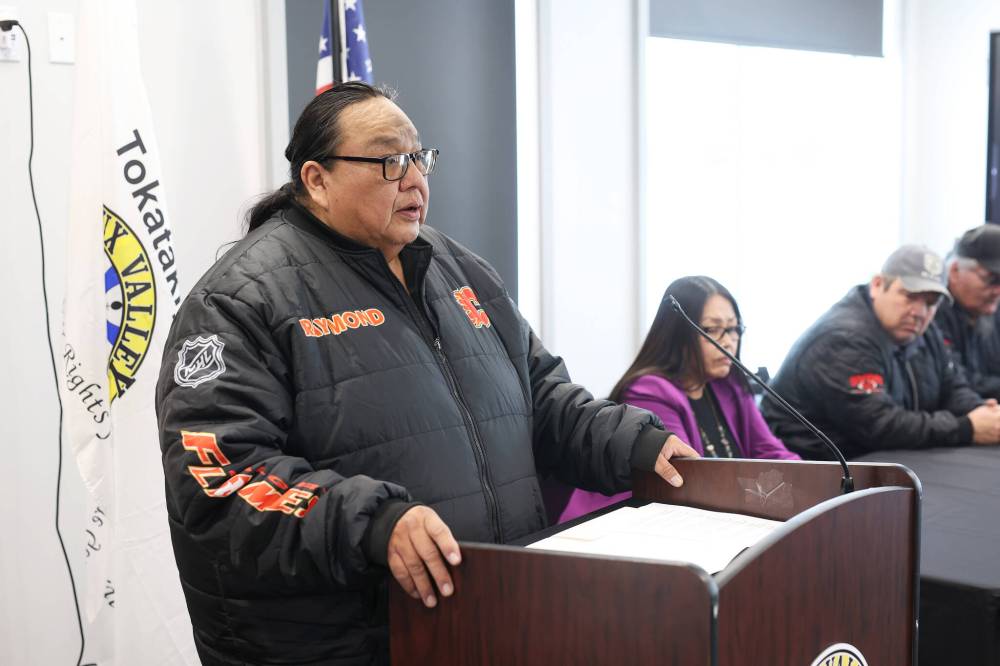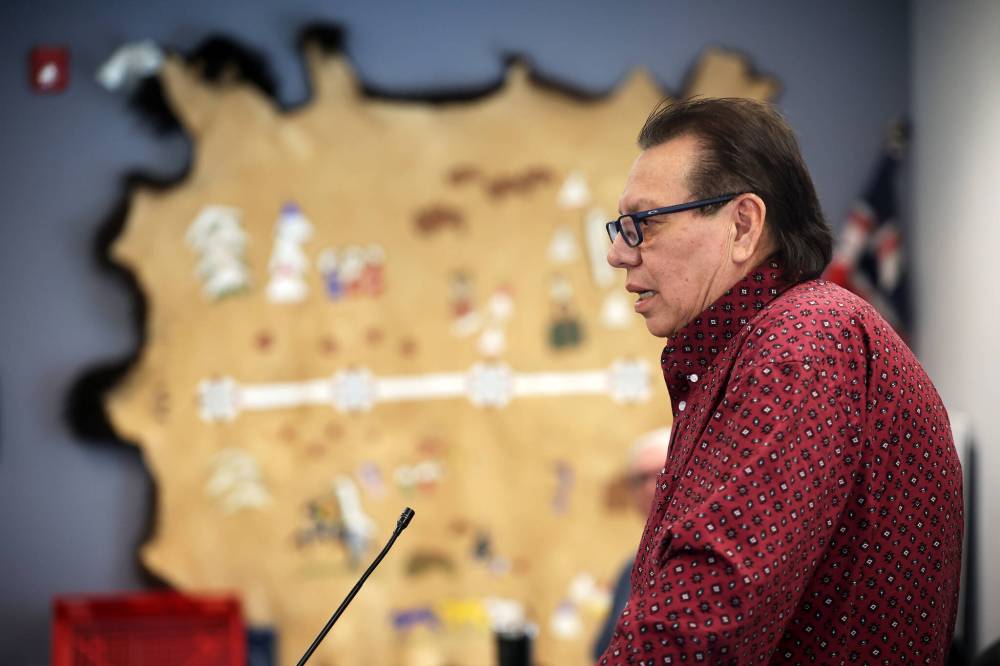As the federal government prepares to issue a formal apology on Monday to Dakota and Lakota First Nations for historical actions taken against them, two Westman chiefs say it’s only the beginning of some hard work needed to improve their communities.
“It’s been coming for a long time,” Canupawakpa Dakota Nation Chief Raymond Brown told the Sun by phone on Friday.
On Thursday, the government announced Crown-Indigenous Relations Minister Gary Anandasangaree will travel to Whitecap Dakota Nation just south of Saskatoon to apologize to nine First Nations from Saskatchewan and Manitoba.

Canupawakpa Dakota Nation Chief Raymond Brown said the apology is a recognition that the history books do not tell an accurate story about the Dakota. (Tim Smith / The Brandon Sun files)
Those communities are Birdtail Sioux Dakota Nation, Canupawapka Dakota Nation, Dakota Plains Wahpeton Nation, Dakota Tipi First Nation, Sioux Valley Dakota Nation, Standing Buffalo Dakota Nation, Wahpeton Dakota Nation and Wood Mountain Dakota First Nation.
While the media release does not specify what the nature of the apology is, Brown and Sioux Valley Chief Vince Tacan told the Sun Friday that it is for Canada designating Dakota and Lakota peoples as refugees in the aftermath of them coming north after military conflicts with the United States in the 1860s and 1870s.
Sioux Valley is roughly 50 kilometres west of Brandon, while Canupawakpa is around 100 km southwest of Brandon and just north of Pipestone.
The First Nations have long argued against that designation, as they consider the areas of what is now Canada as part of the traditional territory they held before the arrival of European settlers.
On top of that, they believe that while Canada does not have treaties with them, the country should honour alliances held with the British before Confederation, such as when the Dakota helped fight against the Americans in the War of 1812.
In 2008, Manitoba’s Dakota First Nations rejected a $60.3-million settlement offer made by the Harper government that would have required them to give up any rights to future treaty rights, land claims or hunting rights.
“This was our territory before any Europeans arrived on this earth,” Brown said. “That little magical line between the United States and Canada, to us Dakota, doesn’t mean anything because according to the Jay Treaty, we’re still in our own lands.”
Signed in 1794, the Jay Treaty between the United States and Great Britain included an article guaranteeing Indigenous people free passage between the U.S. and British North America.
Brown said the apology is a recognition that the history books do not tell an accurate story about the Dakota, adding that he is proud of his people’s history.
“We’re not asking for all of Canada back, we’re just asking for that recognition that we are in our own lands.”
The chief said the apology will also signal the start of work with the federal government to negotiate rights Dakota people do not have compared to those who signed treaties with the Crown. That process may take a couple of years to complete, he said.
“Dakota will have our own status and Canada needs to recognize that right across this country, everywhere we go, just like a treaty Indian,” Brown said.
Also reached by phone, Tacan said that while Dakota contributions to the War of 1812 were acknowledged in the conflict’s bicentennial anniversary, steps are only being taken now to recognize how harmful the refugee designation was.
“We’ve never considered ourselves refugees, so it didn’t really impact our resolve in that regard,” Tacan said.
“We had always considered ourselves, first and foremost, Dakota people … It is still good to get an acknowledgment because the label was harmful in that it allows governments, including the provincial, federal departments and even other First Nations governments and entities, to marginalize us.”
He said Dakota nations received fewer services and less land than First Nations that signed treaties. This probably held them back 70 or 80 years, Tacan said.
Examples of this the chief brought up were a lack of Dakota-owned casinos in Manitoba and how Sioux Valley had only recently been able to convert lands it owns to reserve status.
Earlier this year, Tacan, Brown and Chief Don Smoke of Dakota Plains First Nation signed a memorandum of understanding to open a casino on land owned by Sioux Valley near the corner of the Trans-Canada Highway and Highway 21.
On the progress of that project, Tacan said he doesn’t know if it’ll come to fruition by the end of his term next year.
Like Brown, Tacan said what comes after the apology will be critical for Dakota nations.

Sioux Valley Dakota Nation Chief Vince Tacan said Dakota nations were held back because they received fewer services and less land than First Nations that signed treaties. (Tim Smith / The Brandon Sun files)
“There will be some work on the part of Sioux Valley in advancing our claim to get the land that we should have had,” Tacan said.
“We need to receive the same benefits as any other First Nation and we also need to be part of the economy.”
Beyond compensation and land, Tacan said he hopes the apology will help dispel the myth that Dakota fled the United States and that they were refugees.
For Dakota Plains, around 130 km west of Brandon, Smoke said Monday’s apology will be the second they’ve received in the last month.
In 1911, the City of Portage la Prairie passed a motion banning Dakota people from living in the city, banishing them from land they owned within city limits. On June 26, Portage council officially rescinded the motion and apologized for it.
For Smoke, the federal apology represents a continued opportunity for Dakota people to add their side of the story to the history books.
“I feel like we’ve been treated as second-class First Nation citizens for far too long now, in an area we consider our own unceded territory,” Smoke said.
He agreed that the status of the Dakota people has deprived them of rights others have, including those in section 35 of the constitution included the government’s duty to consult them when carrying out business that affects them.
“The admission from the federal government that we are from Canada and we are a rights-bearing nation and that we are entitled to section 35 rights helps us to start to negotiate on a nation-to-nation basis, as opposed to always being looked down upon as a sort of foreigner or refugee,” Smoke said.
Brown, Tacan and Smoke said they would be heading out to Saskatchewan on Monday for the apology with members of their communities.
Smoke said it was going to be an emotional day for him. Dakota Plains has a hereditary rather than elected chief and he said his late father Ernest always talked about securing recognition of the treatment of their people when he was chief.
“He used to say that (the treatment) was because the Dakota people were hard workers and we wouldn’t conform,” Smoke said. “We were independent and he used to say that the federal government did not like that, they wanted us to be dependent on the government like many others. “
Representatives for Anandasangaree and Southern Chiefs’ Organization Grand Chief Jerry Daniels told the Sun they were unable to comment on Friday.
Birdtail Sioux Chief Lindsay Bunn declined to comment when reached by phone and the Sun was told Dakota Tipi Chief Dennis Pasha was busy organizing the community’s annual sundance event.
The apology ceremony is scheduled to take place at 9 a.m. Saskatchewan time on Monday.
» cslark@brandonsun.com
» X: @ColinSlark